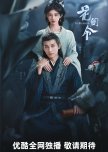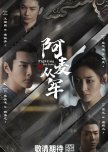
Fake it till you make it.
Regeneration is an excellent short suspense thriller. The narrative opens with a reporter He Shan witnessing the kidnapping of her contact Fei Ke. In classic Christie style, five strangers including He Shan are summoned to an island mansion for the reading of Fei Ke's will. They are each asked to share their memories of Fei Ke before the will is read. As implied by the homonym of his name, Fei Ke was not who he appeared to be; he showed a different self to each of them. As they piece together their memories, a complex, disturbing and moving picture of Fei Ke emerges.Jing Boran delivers a compelling portrayal of Fei Ke as a charismatic, amoral "fake it till you make it" kind of character. I don't think any other actor could have evoked such complex and contradictory reactions. At many points in the narrative when I wanted to absolutely despise his Fei Ke, I found myself searching for excuses for him. Yet when I could have and should have empathized with him, I found myself judging him. All of the characters have many layers that peel off like an onion. Like Fei Ke, they all have at least one moment of hesitation before they almost willfully make a fatal, life changing decision that takes them down the path of no return. By the end of this web of lies, the only story that moved me was that of the two lovers star crossed who ended up as collateral damage. Everyone else reaped what they sowed; even Fei Ke who believed his own lies to the point he deceived himself more than anyone else.
The plot pulled me in from the start and kept me wanting more with each reveal. However, at the point of reversal, changes were deliberately made to the original novel plot, likely to avoid book spoilers. I think this was big mistake. As a result, plot holes emerged and the final three episodes did not come together as well as they could have. In the novel, the group gathered because the main antagonist wished to make amends. That is simple, straightforward and easy to understand. In the drama, they gather as a result of a convoluted and rather far fetched revenge plot. Some of the character designs and motives were changed in to make this work. Some of it just didn't make sense as those parties could have achieved their objectives in more direct and effective ways. This is made worse by the melodramatic storm at the end where everyone does silly things for some cheap thrills.
Even though the ending was overly dramatic and could have been more tightly written it was dark and consequential. All things considered, this is a suspenseful and thought provoking watch with many unexpected twists and reversals. And If you need a shallow reason to watch it, Jing Boran looks yummy in every scene. My rating 8.0/10.0.
¿Te ha parecido útil esta reseña?

The Pig, the Snake and the Pigeon
A 8 usuarios les ha parecido útil esta reseña
Three birds with one stone.
I am a huge fan of black comedy and throw in some gangsters and I am hooked. Chen Kuilin is an infamous hitman on the run. Diagnosed with terminal illness, he tries to turn himself in only to discover he is merely the third most wanted criminal in Taiwan. Quivering with outrage, he sets out to secure his street creed as the biggest, baddest, bad guy of them all by taking out his competitors.Ethan Juan floored me with his complex portrayal of this brazen, brutal, narcissistic gangster with crazy but understandable motives and an odd instinct to protect the weak. His close shave with Hongkie had me on the edge of my seat and their killer vs killer fight scenes were raw and savage. His desire for redemption and salvation at the commune surprised me until it didn't. A terrible betrayal culminates in a shocking bloodbath that masterfully builds and releases tension.
This is a well paced, intense and violent action thriller with a number of unanticipated twists. The dialogue is superb and dark humor is deftly used to release tension and infuse a sense of lingering irony. It has all the elements of the good old Hong Kong gangster movies from its distinct cinematic style to the emotional depth of the characters that belies the casual onscreen violence.
I thoroughly enjoyed this movie but I must admit that the final ten minutes left a feeling of nagging disappointment. The perfect place to wrap this up would have been at the reveal of the hitman that takes out three birds with one stone. The last ten minutes embraces maudlin tropes that are characteristic of Taiwanese productions. In this case, it completely ruins the no regrets nature of the beast. I have no choice but to knock 0.5 off my rating so this is overall an 8.0/10.0 for me. I strongly recommend skipping the last ten minutes.
¿Te ha parecido útil esta reseña?

Tou De Jiang Jun Ban Ri Xian
A 21 usuarios les ha parecido útil esta reseña
A hot and cheesy mess.
Though hardly original, this drama's switched bride trope is well executed and entertaining. A very shady prime minister marries his illegitimate daughter Shen Keyi to Wen Ye, a prince and the country's God of War posthumously. As it turns out, Wen Ye is very much alive and full of suspicion when he discovers himself married to his enemy's daughter. Meanwhile Shen Keyi is tasked by her stepmother to steal a jade token from Wen Ye in exchange for her beloved nanny's wellbeing. Their early antics are silly but very funny. It was great to watch an older and jaded general fall for a lively, natural and utterly beguiling young girl. The leads have good chemistry and both actors deliver convincing performances. I also enjoyed the comedic banter between Wen Ye and his two sidekicks.At twelve episodes this drama was hilariously hot and cheesy but by twenty-four episodes it turned into a hot and cheesy mess. The palace plot becomes increasingly convoluted and absurd and both lead's adorable silliness descends into stupidity and melodrama as they navigate multiple obstacles. Ultimately, the much simpler love story between the princess and the guard moved me more. The ending is a bit rushed but it was actually pretty good in the messiest way possible. All considered not the worst drama to watch to just pass some time. I rate it 6.5/10.0
¿Te ha parecido útil esta reseña?

Florece en la Adversidad
A 28 usuarios les ha parecido útil esta reseña
Buns of Steel.
Blossoms in Adversity / Xī Huā Zhǐ/惜花芷 is the story of superwoman Hua Zhi's feel-good romp through feudal China. When Imperial Censor Hua dares to criticize the monarch, he is exiled along with all the men in his family. A bevy of helpless women and young children are left to fend for themselves. Hua Zhi takes charge and rallies the women together to triumph against overwhelming odds. When she flexes her buns of steel, no feat is beyond Hua Zhi! She parleys a candied hawthorn business into a pastry and restaurant empire, picks up stray royal children, foils a few palace plots, build schools and a canal, rescues the Hua family men and even manages to find time to fall in love! All in the space of a 2-3 years!!! Phew! Even superwoman would surely stagger from sheer exhaustion!This narrative paints a distressing picture of how oppressive life was for women in hierarchical ancient Chinese patriarchal society. The best part of this drama is how in order to survive, the women defy social conventions, set aside petty differences, learn to trust each other and work together towards shared goals. While the sheer scale of their financial and other achievements are preposterous, there is something very cathartic and satisfying about how flamboyantly they flourish. The storytelling is squarely centered on Hua Zhi and speeds through many of the supporting character arcs, leaving their motivations and struggles under-developed. This is a pity because family dramas like this are most compelling when important supporting characters are given enough agency to be the main characters of their own arcs.
This is one of those dramas that is best enjoyed superficially and with heavy suspension of disbelief. Upon closer scrutiny, the overarching empowerment theme is contradicted by some of the sub-plots. I was disturbed by the different treatment of domestic abuse in Hua Jing and Hua Xian's case. But what I disliked most was what happens to Hua Rong and her child. It is as if she learned nothing from her family's struggles about resilience in the face of adversity. There are a few poorly developed sub-plots like this that the writers raced through without thinking carefully about the messaging.
As much as I like Zhang Jingyi, this is not her best role. Her interpretation of Hua Zhi is too perfect, too calm, too understanding and too reasonable. This has led to many Mary Sue comments about the character. But Hua Zhi is actually written to have many flaws - she can be over confident, she cannot mind her own business, she is reckless and like her grandfather, she cannot hold her tongue. In the canal arc, she is the architect of her own downfall but because everyone unites around her, she never suffers any consequences for her actions. This character has too much plot armor and is already so smart and capable that she shows virtually no growth from beginning to end.
Hua Zhi's relationship with Gu Yanxi is similarly whitewashed to the extent that it appears too ideal to be true; it lacks passion, conflict and intensity. Hua Zhi lets Gu Yanxi off too easily for deceiving her in the beginning when any normal person would be at least a little bit angry at him. She also never communicates any discomfort with his role at the Security Bureau; indeed she seems quite happy to use his authority there to serve her purposes. Thus, it came as much as a surprise to me as it must have to Yanxi that it could be a deal breaker for her! So much for their so called mature, open and communicative relationship! I don't know why young actors like to make their characters so perfect all the time and have such a hard time embracing more complex but perfectly natural human relationship dynamics and emotions.
Hu Yitian delivers a more nuanced portrayal of Gu Yanxi as the emperor's sharpest knife. His fight scenes are phenomenal and he is menacing and ruthless as the commander. He shows us he is a different person; more open, at ease and happier when he is with Hua Zhi. While this is one of Hu Yitian's better roles to date, he shies away from showing us the true extent of his affection for the emperor and his inner conflict. This is a missed opportunity because Hai Yitian delivers a compelling portrayal of the lonely, paranoid and manipulative emperor. Because Hu Yitian's portrayal of Gu Yanxi does not meet him halfway, the emperor's affection for his nephew comes across as borderline obsessive and a lot more one sided than it really is.
Even though it seems her character Shaoyao is dumbed down from the novel, Lu Yuxiao is once again a scene stealer in this drama. This kind of beguilingly innocent, simple minded savant kind of character is extremely difficult to portray well but Lu Yuxiao pulls it off brilliantly. She doesn't get enough screen time to steal the show but I was more invested in her character than I was in Hua Zhi who is too perfect to be relatable.
The ending of this drama really cracked me up. It is one of the few times that the villain actually saves the day by doing what Hua Zhi and Gu Yanxi could never have done. Although it is also possible that Gu Yanxi learned his lesson not to look for needles in hair stacks and had the good sense to show up a just a tad late at the ceremony. Despite some flaws, this is a very appealing feel-good drama for those seeking light entertainment. My rating 8/10.
¿Te ha parecido útil esta reseña?

Thief of hearts.
Five Kings of Thieves is a fast paced Republican period wuxia. Zhang Siye puts a mysterious artefact up for auction. This object is said to lead to the whereabouts of the first emperor's mythical cauldron. This draws many opposing interests out of the woodworks; including historic guardians of the treasure, the Five Elements Families. Revolutionary students determined to protect China's national treasures from Japan's Black Dragon Association also jump into the fray.Huo Xiaoxie is just a scrappy orphan and the only treasure he is after is just some nice dim sum to celebrate his shifu's birthday. He sneaks into the Zhang mansion to steal some and bumps into Shui Yao'er, who is after a far more valuable object. They fight into love as they are caught up this high stakes treasure hunt with devastating and life changing consequences. Zheng Zedao a constable with an unknown agenda recognises his resourcefulness and bails him out of a few tight spots. As their enemies encircle them, this thief of hearts races to unlock his own hidden powers to secure the treasure and win the girl.
This is a low budget action packed adventure with many twists that weaves in many brave and colorful jianghu characters with their own side stories. I enjoyed both Ren Min and Darren Chen's slightly exaggerated acting and cute chemistry in this. Its a bit rushed at the end and I could see some of the twists coming early on but still enjoyed watching them play out. The slightly slapstick sequences and the look and feel of this entire production is nostalgic of the old HK TVB Republican era action adventures. Its quite campy and the editing is not the best but with only 12 episodes its a nice, quick watch. My rating 7.0/10.0
¿Te ha parecido útil esta reseña?

Switched by the witch.
In Blossom or 花间令/Huā Jiān Lìng (The Flower Order) is a mystery romance with fantasy elements. I checked this out because of Liu Xueyi, an under appreciated actor who is just as good an antagonist as he is a protagonist. Despite some flaws and controversy, this sleeper hit won Liu Xueyi high praise for his good looks and compelling acting.Yang Caiwei is a scarred, inauspicious undertaker shunned by citizens of the sinful city of Heyang. She finds herself embroiled in a murder case with the new magistrate Pan Yue, the most handsome gentleman in the capital. As it turns out, before misfortune befell her family, she was engaged to Pan Yue and he seems determined to honor their betrothal. On their wedding day, she is switched by the witch Shangguan Zhi using dark magic. She finds herself in Shangguan Zhi's body right before "Yang Caiwei" is murdered and suspects Pan Yue of doing the deed! Assuming Shangguan Zhi's identity, she investigates her own murder by working for Pan Yue at the yamen in the hope of finding evidence of his complicity. Body swapping is the only fantasy aspect and it is readily accepted without that much disbelief by the characters in this story.
This production drew early criticism because Zheng Hehuizi guest starred as Yang Caiwei for two episodes and impressed viewers with how she interpreted the role. Her Yang Caiwei is a solemn character; a child whose world was shattered overnight and endured nine years of hardship. She finds meaning in following her shifu's footsteps as a coroner, obtaining justice for victims of foul play. This characterization of Yang Caiwei makes sense to me but unfortunately, there was no meeting of the minds in how the role should be portrayed. Although Ju Jingyi delivers an adequate performance, her depiction lacks depth and gravitas. Her Yang Caiwei is literally only Shangguan Zhi; a happy, pampered young lady who never suffered a day in her life. She is so un-serious as a coroner I just scoffed at her autopsies. Still, she didn't quite ruin the show for me as she is so pretty and charismatic I always have a soft spot for her. I just sigh for the opportunity missed because Yang Caiwei is one of the better written female roles and Liu Xueyi is a fantastic actor to be paired up with. She could have impressed enough with a more layered performance to break her out of her usual typecasting but sadly she did not approach this role thoughtfully enough.
While I watched this for the suspense plot, both romances are nicely written. Liu Xueyi and Ju Jingyi look so gorgeous as a couple that their visuals alone deflect many flaws. To me, Pan Yue’s early obsession with Yang Caiwei was not healthy or well founded but I enjoyed how he fell for her against his better instincts thinking she was the detestable Shangguan Zhi. I never faulted Pan Yue for taking so long to figure out she was Yang Caiwei because both actresses failed to show me of they are the same girl. I like how Zhuo Lanjiang is written to be as capable and powerful in his own way as Pan Yue. He is a credible love rival that does not descend into delusional archetypes. But I wasn't that invested in his romance either.
After the big letdown of Youku's big budget Judge Dee's Mystery, this much more modest production satisfied my craving for a good mystery. The cases, beginning with Yang Caiwei's own murder hooked me from the get go. I enjoyed how each case pulls at threads to reveal links initially to the four major clans of Heyang and ultimately a far wider conspiracy that goes back many years. This familiar formula used in many other investigative series is quite well executed. Despite small plot holes, the focus on the human tragedy aspect of these side cases made me either empathize with the victims or at times even the perpetrators. This is something both Judge Dee's Mystery and Mysterious Lotus Casebook failed to do. The main villain is neither too obvious nor revealed too early, which was my biggest gripe with Mysterious Lotus Casebook. This one does well in keeping us guessing right up till the end. However, this is achieved by concealing information from the viewer instead of hiding all the clues in plain sight.
The narrative hiccups in the final arc back at the capital. It seems like a different writer took over. The villain is revealed shortly after they show up onscreen instead of building suspense for a bit. The final villain is not that smart and only gains an upper hand because two hitherto smart characters are thrown under the bus and exercised their free will in unintelligent ways. It always makes me angry to see good characters get undeserved outcomes so I am not happy with how this ends. Good characters were literally wasted just to squeeze some tears from the audience. Instead of ending on a big reveal, it just descends into melodrama. The chilling ending epilogue however is well done but to avoid spoilers I will elaborate on that below. All things considered, this is still an enjoyable watch. I would have rated it 8.0/10 were it not for the ending. My final rating is 7.5/10.0.
ENDING SPOILER COMMENTS
The ending epilogue is a nice chilling way to end regardless of whether Season 2 gets the go ahead. If there is no Season 2, it suggests that #1 is some kind of arch nemesis of Pan Yue, like Moriarty to Holmes who is still out there; that organizations like The Flower Order are not that easy to wipe out. Note there are actually 9 tokens in total in the end scene.
If there is a Season 2, the mastermind is either someone we already met or someone that has not yet appeared onscreen. Recall #2 only shows up in the final arc so this writer does not play fair with the audience. In that case, it is not useful to speculate further. If however, the mastermind is someone we already met, I think it is most likely Shangguan Lan. It is evident from the plain cyan sleeves that it is a man and while the cloth is rich, there is no elaborate embroidery on the sleeve like the nobles and high officials like Pan Yue and Minister Pan wear. The Shangguan family keeps a private army and they have the vast resources and network to be behind this kind of clandestine organization. They also have links to witch doctors and dark magic, which is how Shangguan Zhi swapped bodies with Yang Caiwei. So it would not be surprising that they worship pagan gods like the ram god. I initially ruled out Shangguan Lan due to his age, but he could have inherited the token from his father.
There is also a possibility the mastermind is a woman because the Chinese title is The Flower Order. In that case, it could either be The Empress or Qingdi, who now pretty much controls Heyang after Pan Yue effectively eliminated all her rivals for her.
X
¿Te ha parecido útil esta reseña?

Tale as old as time.
The Legend of Shen Li is a highly entertaining xianxia with a terrific starting hook. Injured while fleeing an unwanted marriage, Shen Li crashes into the mortal realm in her innate phoenix form. Mistaken for a chicken, she is rescued and healed by Xing Yun, a sickly ginseng salesman. Never in my wildest dreams did I think I would be shipping an unseemly attachment between a haughty chicken and a weak but insolent mortal. Their hilarious interactions and witty repartee had me grinning like a fool. This has to be the first CP that I got invested in before the FL properly meets the ML.While I find Legend of Shen Li quite enjoyable, it is a tale as old as time and I am not just making fun of Xingzhi's age. This kind of forbidden love story between a lonely, crusty old god and a much younger one is the staple of this genre. This one is written more as a character story so there is little plot movement until the second half of the drama. The plot itself leans heavily on well known xianxia tropes with a modern, role reversal approach. What makes it special is that it is well executed, the main CP has scorching chemistry, it is anchored by a stellar cast and tongue-in-cheek dialogue has deep and heart tugging undertones. This is an excellent entry-level xianxia that will thrill and delight newcomers to the genre the most. While die hard fans of the genre will certainly enjoy the fresh take on old themes, they may find the plot predictable after the early arcs.
For me, the mortal realm is always the most interesting xianxia arc and this is no exception. It is at the same time the most disappointing arc in terms of missed opportunities. It is too short and half the time Shen Li is an angry CGI bird. Shen Li's feelings for Xing Yun developed so quickly I felt shortchanged on the how and the why she fell in love. Worse, their story is overshadowed by the two utterly heart wrenching ill-fated love stories. To some extent, the narrative coasts on the residual heat from Princess Agents and assumes the audience is already invested in the main CP. The issue is viewers who did not watch that may not feel the chemistry between them. The arc ends so abruptly that it barely dawns upon me that Shen Li's affections could be one-sided. She very high-handedly falls for a helpless mortal and doesn't give him any say in the matter because she knew it to be transitory. This is quite sad and complex and it is a pity the narrative dealt with it too cursorily.
As someone hungering for closure from Princess Agents, I am stoked to report that the chemistry between Lin Gengxin and Zhao Liying burns as hot as ever. This drama is generous to a fault in fusing passionate love scenes with humor and moving romantic moments. I find myself chuckling at how hot and flustered Shen Li gets by Xingzhi's shameless flirting until the veiled pathos behind Xingzhi's careless words hits me and makes me tear up. Both characters are designed to recycle the strengths of their previous collaboration without taking much risks. Notably, there is no extra dimension or complexity to Zhao Liying's role or portrayal. She once again delivers in spades what she does best from the brilliant, combative glitter in her eyes to her signature awesomely bad-ass fight scenes. I would have liked to see more facets to King Bicang beyond the fierce warrior with a deadpan expression who is casually cruel to CGI animals. There is more scope for Lin Gengxin to shine as Xingzhi is a contradiction; the most powerful and yet the most powerless being in the three realms. I was impressed by Lin Gengxin's heart wrenching and nuanced portrayal of this so very alone ancient being who will crack a joke to stop your heart from breaking for him.
As a couple, Shen Li and Xingzhi are too perfect for each other - their world view is largely aligned and besides the one bombastic obstacle of an existential crisis for the realms, there is no real conflict in their relationship. While they experience some acutely angsty moments, they are all short lived. Most of the intense and lingering agony in this xianxia actually comes from the three devastating side love stories. Both characters are fully realised beings that don't grow much. That is left to the likes of Furong who is my favorite character in the first half of the narrative and the character that shows the most growth overall. His limelight in the second half is stolen by Lady Jin who is by far my favorite character and one who saves the draggy second half of the show for me. I find the villains quite boring and archetypal and those roles are also the least well acted. Even though Shen Li and Xingzhi come together in a moving and masterful ending climax, the finale is too much of something I have seen many times before. I did not enjoy the extended ending fight sequences and the heavy handed CGI.
Despite the unoriginal plot, this is an excellent character driven story. I was invested in many characters beyond the leads - Furong, Youlan, Qing Ye, Feng Lai, Mofang, Lady Jin and the indignant Cluck Cluck. The dialogue uses comedy brilliantly as a gateway to the profound in highlighting complex, deep and at times tragic existential themes. I enjoyed the conversation about how if we can work together against evil, we may no longer need gods to be our babysitters. I also felt a shiver of fear in this age of AI at the idea that as creators, one day we will become an existential threat to our creation. Overall a very enjoyable and highly recommended funny and intelligent xianxia that I am happy to rate 8.5/10.0.
¿Te ha parecido útil esta reseña?

To Ningdom Come.
Eternal Brotherhood or The Three Heroes of Light/光明三杰/Guāngmíng Sān Jié is the first instalment of the live action adaptation of popular fantasy novel Purple River/紫川/Zǐchuān. The narrative opens in the thick of a gripping battle scene in a complex fantasy world and never stops to explain itself. The world building, political dynamics, power structures and character backstories all have to be pieced from the dialogue. It does not help that the plot is heavy with political intrigue and many opaque Machiavelli characters scheme against one another. Casual viewers out for light entertainment will find this storytelling approach frustrating and confusing.Zichuan is a loose coalition of different warlords, noble families and clans in a war torn continent. Yuanzhou is the battlefront, the critical buffer province that stands between Zichuan and their arch enemy Beizu or the North Clan. Food is the scarcest commodity in that strategic battle-torn province that is rich in resources. Power in Zichuan is divided as the Chieftain Zichuan Canxing of the ruling Zichuan family must answer to the Elders Council. The family's grip on power is underpinned by a sworn brotherhood between the previous Chieftain and two powerful commanders; Yang Minghua who secures the capital and Ge Yingxing who secures Yuanzhou. This alliance frays as Yang Minghua is widely expected to rebel. This is the back drop that Zichuan Xiu, foster son of the late Chieftain returns to after a seven year exile in Yuanzhou. The time is ripe for a changing of the guard as the next generation's three heroes Di Lin, Si Yilin and Zichuan Xiu emerge. There is a subtly ominous foreshadowing as they are clearly parallel characters with their predecessors.
One of the keys to understanding this story is that actions speak louder than words and no one says what they really mean; not even when their interests are aligned. This is clearly conveyed in the secret bathhouse scene; the only safe place in the capital for Di Lin, Si Yilin and Zichuan Xiu to speak freely with one another. Of the brothers, Si Yilin is the most reliable and almost blindly loyal one. Di Lin is also quite easy to understand; a ruthless, vehement and dangerous character who cares for very few people. Zhichuan Xiu is a cunning and complex character that hides behind an indifferent and flippant facade. The first arc (~12 episodes) that introduces the three heroes is strong as they work together to put down a rebellion. It is nice to see Yang Xuwen, Liu Yuning and Zhang Mingen work so well together in their first collaboration. Their rapport and humorous banter lightens the portentous, politics heavy tone of the story.
The second arc explores Zichuan Xiu's relationship with the Chieftain Zichuan Canxing and his niece Zichuan Ning. It is anchored by masterful portrayals of two Machiavelli mirror characters who are not quite yet opponents; warily circling and assessing each other. Yang Xuwen holds his own well in this match up against a veteran like Ma Shaohua. Their dialogue is quietly menacing with doublespeak, layers of hidden meaning and traces of irony, and dark humor. This is a rare drama where I feel real genuine fear that the protagonists may be up against a more powerful and possibly smarter antagonist.
I was so busy wishing Ning to Ningdom Come that it took me a long time to realise she is quite an important character. Not only is she next in-line to be Chieftain but Xiu actually cares deeply for her. This role is not well acted to begin with and made worse by the choice of a terrible voice actor. Consequently Ning comes across as little more than an annoying, childish, spoiled and shallow princess that gets too much airtime. In reality, scheming is in Ning's blood and she has an innate shrewdness and strong survival instincts. She fears Canxing and wears the persona he expects as a silly princess only capable of learning the cartoon version of history and nowhere near ready to assume power to allay his paranoia. In their opening scene together, both Ning and Xiu are role playing the pampered princess and her foolish swain. Unlike Yang Xuwen however, the actress is not able to convey any hidden depth to Ning or that there are layers underneath her words. But if you watch her carefully, she is quite clever in how she helps Ka Dan and Si Yilin and she has a far better grasp of the power structures of Zichuan than she lets on. If they had cast an actress better versed at complex roles, her arc would be more enjoyable and how Xiu grew apart from her would be seen as a sad development rather than a cause for widespread rejoicing.
Considering the limited budget they had to work with, the cinematography, camera angles and overall visuals are really nice and it is quite clear that this drama was made with care. Even though the dialogue is extremely well written, it is too unbalanced and too much plot movement happens via exposition; making battlefront developments hard to follow. The too few action scenes that occur mostly at the beginning and at the end are exciting and very well choreographed. Even the CGI is not heavy handed and is actually really nice.
I find it really difficult to rate this drama at this point because it actually ends in the middle of an arc and is thus unfinished. Even though it ends with a superb line, it does not change the fact that this is not only unfinished but also sloppy enough to not even close the Lei Hong arc. The production's two fatal flaws are not making the world building accessible and in mis-casting Ning. Nonetheless, I really enjoyed this drama and am going to temporarily rate it 8.0/10.0. I will revise up my overall rating for the Zichuan series if the second instalment The King of Light/之光明王/Zhī Guāngmíng Wáng wraps everything up well. I think a strong case can be made to wait to watch this in its entirety when the second instalment airs.
¿Te ha parecido útil esta reseña?

Can't judge a book by its cover.
Judge Dee is one of the most widely adapted and iconic ancient Chinese detective figures in popular culture. Di Renjie, or Judge Dee was a prominent Tang Dynasty official and twice chancellor to Empress Wu Tzetian. In the 19th century, Dutch sinologist and diplomat Robert Van Gulik translated an 18th century novel by an anonymous author Dí Gōng Àn/狄公案/Celebrated Cases of Judge Dee, into English. He went on to write numerous other Judge Dee mysteries, increasingly crafting Judge Dee in his own image. Van Gulik's books are regarded as a cultural bridge between East and West. They were devoured by the Chinese diaspora long before Tsui Hark fanned the flames with his wildly popular Detective Dee movies.Judge Dee's Mystery/大唐狄公案 loosely adapts nine cases from Van Gulik's novels for the small screen. This drama has notably high production values with lavish sets and costumes designed to create an immersive visual experience. The cases are well crafted with meticulous attention to detail and pay homage to Judge Dee's reputation as a people's hero; a champion of truth and justice for the common people. The cases highlight the discontent at some of Empress Wu's policies and shortcomings of the Tang Code, China's earliest legal code. Di Renjie gained many insights on the struggles and aspirations of the common citizens as magistrate of many important provinces across the empire. This shaped him into a great statesman and reformer in his later years; a chancellor often known to stand up to the formidable Empress.
This is the kind of drama that I should love - its my favorite genre featuring my favorite Chinese detective, set in my favorite Chinese dynasty and is helmed by a few of my favorite actors. The fight scenes are fantastic and the whole thing just looks gorgeous and bloody expensive. Which just goes to show you, you just can't judge a book by its cover. Because even though there are some really great moments, overall this drama just bored me silly.
The problem with the cases is that the four episode are too long when the villain is usually obvious from the beginning. There is not enough development of the suspects or the victims to make the audience care about the why-did-it. The audience also does not get to participate in the solution. Instead, the intricacies of the how-did-its are revealed as flashbacks in Judge Dee's mind's eye. The cases do get better in the latter half as they tie into Judge Dee's past and are shored up by the appearance of characters like Diao Xiaoguan (Zhang Ruoyun) and Lin Fan (Jiang Yi). Even then, the writing tends to tie the minute details together well while leaving big gaps on important things. Thus it is never fully explained what Diao Xiaoguan's motives were or what terrible thing the young scion of a noble household did that got him disowned and left to fend for himself.
The biggest issue with this drama is that Zhou Yiwei pretty much carries the entire crime-solving team by himself. None of the supporting characters are well designed and there is zero chemistry between Ma Rong, Qiao Tai and Judge Dee. This is made even more obvious when Deng Xiaoguan shows up and there is a tangible difference in the dynamics between everyone. Both of Dee's sidekicks appear and disappear inexplicably in the middle of a case as and when the plot requires. Ma Rong is written to be a comically obnoxious character but there is nothing funny about her obnoxiousness. This is the obvious the weak link in the cast and one that is utterly lacking in charisma that unfortunately gets too much airtime. Inasmuch as Zhou Yiwei and Wang Likun deliver a heart-stopping and mature portrayal of attraction and love at first sight, sadly Cao An is written to be a blank character; an elegant musician well past her youth clinging to a silly girlish fantasy over a highwayman (face palm). She only serves decorative purposes until the final case, where she finally gets to shine with her bravery and her foolishness.
In conclusion, this is a visually stunning production that stays true to its source material in terms of setting and thematic elements. However, despite some exciting and well choreographed action scenes, it fails to deliver truly captivating mysteries and is bogged down by lackluster supporting performances. While the cases in Strange Tales of Tang Dynasty (2022) are only a tad more tightly written, the humor and fantastic crime solving team dynamic elevates that series over this one. That said, Judge Dee's Mystery is not a terrible way to pass some time even though it ultimately falls short of making a lasting impression. I rate this Seasons 1 a 7.5/10.0. Season 2 has been filmed and should air by early 2025.
¿Te ha parecido útil esta reseña?

For clown and country.
Fighting For Love is a drama adaptation of a novel with the same Chinese title Ā Mài Cóngjūn/阿麦从军 or A Mai Joins the Army. The novel enjoys an impressive 8.6 score on Douban. It is a female centric story about A Mai, an orphaned noblewoman who seeks justice for her family's betrayal. She joins the army and works her way up to become a fierce and undefeated general. She discovers a greater purpose along the way, which is to defend her country. This takes place during the Northern and Southern dynasties, a period of war, chaos and political turmoil. It is not a romance and there is no real male protagonist; it is about one brave and patriotic woman's awesome journey. I abandoned the book because of its intense and graphic focus on war.Clearly the original story does not fit with the typical male-centric costume drama formula with plenty of romance tropes. What a breath of fresh air, right? Wrong. In the adaptation, Shang Yizhi is elevated to male protagonist and his story arc is as central as A Mai's. Which in and of itself, is not a terrible thing. Like A Mai, Yizhi has a hidden identity and was a victim of foul play. His cause becomes hers as she rescues him and helps him outsmart his enemies. She discovers her military prowess, forms life and death bonds with her troops and finds meaning in defending the citizens of Nanxia. They have a shared purpose and are catalysts for each other's growth. It is natural for attraction or feelings to develop between them though it does not need to be romantic.
The critical fail in the adaptation is they wrote Yizhi as a kind hearted and playful anti-hero character. While some of his comedic scenes are witty and funny, this diminishes him into a parody role. This should be a complex character who does consequential things; a once carefree young nobleman whose world changes overnight. Instead, the writers stuck him with a love brain and Peter Pan syndrome until the final arc. As he is pushed first to survive and then to reclaim his birthright, all of his motivations continue to simply revolve around A'Mai. A character that chooses each time to save the girl and let the world rot does not deserve to end up where he does! This devalues A'Mai and the Zhenbei army's achievements and sacrifices into a fight for clown and country. Even though he becomes morally ambiguous and utilitarian at the end, this evolution is too abrupt. His character progression should have begun well before he returned to the capital. Zhang Haowei did his best with this role but the character is just too poorly designed.
A Mai is quite consistently written throughout even though it is difficult to connect with her feelings for Yizhi. Even though she is too lovely to ever be mistaken for a man, Zhang Tianai does a wonderful job with the role. Her mannerisms are very masculine and she literally shakes with rage and hatred in her scenes with Chen Qi. Best of all, she is no Mary Sue in need of constant rescuing even though all the men fall for her. She just has terrible luck with men; she gets involved with a backstabber, a clown and an enemy with a choking fetish. The one good man she meets is brother-zoned, father-zoned and what happens to him is definitely over-kill. Chen Qi is the most interesting and conflicted antagonist and his and A Mai's story is really sad. Wang Ruichang is very charismatic and the fan favorite but his Chang Yuqing has no development and no real story arc. He just pops up whenever something needs to go wrong for the leads.
The first few arcs of this story are quite good and the cinematography and action scenes are pretty awesome. The story falls apart mid-way and snowballs downhill into the palace arc. It is yet another perfectly good drama that is ruined by ignorant and silly romance writers who can't write palace intrigue (i.e., Destined, Legend of Zhuohua, Wonderland of Love etc etc). This arc is ridden with predictable villains, plot holes, clichés and a flabby dancing emperor who looks like a sloppy fashion mistake. To my surprise, the story comes together again in the final episodes to end fittingly and on a strong note.
It is not easy to rate this because there are many good parts. The first 12-15 episodes and the ending is good and worth ~8 but the middle and dreadful palace arc are only worth ~6+. I think ~7.5 overall is fair but I am only going to call it a 7.0 because the production deserves to be spanked for desecrating a fantastic novel.
Scroll down for SPOILER ending thoughts.
ENDING SPOILER
The final showdown between A Mai and Chen Qi is exciting and moving and it finally gives her closure. Poor Chen Qi is such an interesting, conflicted and ultimately tragic character it is a shame he was not better fleshed out. In the end he probably loved A Mai best.
I don't believe it is in character for A Mai to go off with Chang Yuqing at the end. His feelings for her are not better developed than Yizhi's and at least in the drama, they are one-sided. He is a rising star in Beimo and if A Mai were to marry him, she would have to defect to the enemy to be another caged bird as the wife of a Marquis. After just escaping the terrible fate of being the favorite concubine of an emperor?!? As advisor Xu points out, the countries are at perfect stalemate because their top generals A'Mai and Chang Yuqing don't really want to fight each other. There is peace with them glowering fiercely at each other across the border. A Mai is simply setting off for a well earned 3-year vacation while Beimo's internal palace politics play out. It is a perfect, strong independent woman ending in the spirit of the original novel; one that says A Mai does not have to be someone's arm candy to have a meaningful life.
X
¿Te ha parecido útil esta reseña?

A cacophony of crows.
The Story of Minglan is a leisurely and meandering account of how with patience and cunning, Sheng Minglan, the low born daughter of a concubine triumphs over many challenges to achieve both personal and social success. Minglan's father is a middling court official who over indulges his favorite concubine and allows her to turn his household upside down. The petty tyranny of harem rivalry leads to tragedy and Minglan ends up being raised under her grandmother's wing. Minglan's great misfortune has a giant silver lining because this formidable old lady is a force to be reckoned with. She sees to it that Minglan is well schooled and helps her navigate the many pitfalls of harem politics. Minglan blossoms into a quietly underestimated young lady who catches the eye of the most eligible bachelors despite her low status.This drama digs deep into what lurks beneath the genteel façade of Confucian propriety among the status conscious Song dynasty nobility. The deceptively sedate, mundane, humdrum of women living lives of quiet desperation, occasionally broken by shrill outbursts that crescendo horrifyingly in a cacophony of crows. My eardrums barely survived the assault of this panoply of nasty, caterwauling women. The early arcs on Minglan's childhood and coming of age are the best, most empowering ones. The drama climaxes at her vengeance arc, where I found her quiet scheming and utter ruthlessness chilling and impressive. After that the domestic bliss arcs drag on far too long with the couple dealing with repetitive villains with all too similar modus operandi. We really did not need to see version 2.0, 3.0 etc of essentially the same not very smart wicked women archetypes that are too handily dealt with by our power couple.
Zhao Liying delivers a credible portrayal of a docile, Song dynasty noblewoman with hidden depths. The way she digs into you with her eyes, the fleeting cunning smirk and brief flash of fury in her placid gaze foreshadows her evolution into a full-on temper tantrum throwing wife! That said, Zhao Liying is still best at fierce roles rather than as a docile still waters run deep kind of character. Zhao Liying and Feng Shaofeng paint the perfect picture of domestic bliss.Their chemistry is that of a long married couple in harmony and less of the sizzling kind that flared up between her and Lin Gengxin in Princess Agents. It is rare to see Zhu Yilong in a costume drama and I felt real sorry for his Qi Heng who unlike both Gu Tengye and Sheng Minglan, has no free will as he is unable to free himself from the social strictures of his time. The cast overall is very strong with many veteran actors that deliver comical parodies of the ridiculous pretensions of the Song aristocracy.
I am afraid I did not enjoy this very well made drama as much as many other people did. The 70+ episode narrative goes on for too long, conveying an unnecessarily realistic impression of how suffocating it was to be a Song dynasty woman. Considering Gu Tingye's incredibly modern attitudes with respect to polygamy and empowering his wife, I am convinced it was impossible to be a Sheng Minglan in those times. Some of the early arcs are worth 8.5 but the story climaxes too early and is bogged down by repetitive plots in the latter half. This weighs my overall rating down to 8.0. This is a drama that patient viewers with robust eardrums will enjoy more.
¿Te ha parecido útil esta reseña?

Frostbite.
The Frozen Surface is a dark and suspenseful northeastern revival mystery thriller. It is set in the desolate, melancholic northeastern suburbs of Harbin, Heilongjiang, a part of China known for its dastardly dry and freezing cold winters. The dialogue is mostly in Northeastern dialect, which I am not familiar with enough to comment on its authenticity. Despite its wild natural beauty, this area is among the slowest growing economic regions in China. The general lack of economic opportunity and the dominance of a largely industrial manufacturing base forms the general remote backdrop for this narrative. The timeline alternates between the 1990s which were very difficult times and 2005, when things are notably better but still a far cry from China's advanced coastal cities.The violent death of a crime boss and two others throws Lanhe County in disarray as various vested interests scramble to position for the fallout. There are almost too many suspects from a jilted lover, mob rivals, the nephew and heir apparent, the ex-wife and an ex-con; all with motive, means and opportunity. Police captain Guan Yu and his team investigates under time pressure to solve this high profile case. The waters are further muddied with an unexpected confession. Very much like 2023's hit The Long Season, the social commentary about the cruel times, hardships the main characters endure and the desperate, heartless and at times tragic choices they make eclipses the mystery itself.
This drama starts out very well but tries to do too many things. What anchors it is fantastic acting by Chen Jianbin (Guan Yu) and Hu Jin (Yang Si). I thoroughly enjoyed their cat and mouse and how a silent empathy developed between them. Even though some characters do bad things, I feel quite sorry for them. There are also a number of absolutely crazy, bloody and scarily violent maniacs in this drama that adds to the growing sense of dread as the plot builds to a climax. Unfortunately, the main villain's origin story isn't empathetic and they made too many bad decisions along the way to qualify as smart. Some plot points are too obvious or are revealed too early. The logic of many characters collapses into the final two episodes and the plot does not tie together tightly at the end. By then, both the director or scriptwriter's brain must have succumbed to frostbite because so many things just don't make sense or are not well explained.
This is a drama that starts slowly but builds up suspense quite well in the first half. The character stories are quite interesting but sad and they are well portrayed by veteran actors. Unfortunately the mystery part crashes at the end. As an avid mystery watcher, I can only rate this a 6.5/10.0. Viewers who are more interested in the setting and the character stories may rate it a bit higher.
¿Te ha parecido útil esta reseña?

Hope is not a strategy.
The Hope is the Chinese adaptation of a Japanese manga Dragon Zakura about an unconventional teacher who takes on a class of underachieving students. While I haven't watched the Japanese television version, this Chinese adaptation has clearly been heavily localized even though it retains a manga-like flavor in certain characterizations and comedic sequences. This drama critically examines the Chinese education system and its strong emphasis on the all-important Gāokǎo/高考 nationwide college entrance exam which takes 9 hours over two or three days. In a nation of largely single-child families, nothing is more important than getting their only child into the college of their dreams. With over 10mm taking the Gāokǎo each year, the competition is intense. Even though the pass rate is very high (85-90 percent), a minimum score of 600 (out of 750) is needed to gain acceptance to the most elite universities. Less than 7pct of students are accepted at these top universities and the acceptance rate at Qingbei (Tsinghua University and Peking University) where the crème de la crème matriculate is less than 0.1pct.After a series of entrepreneurial setbacks, star lecturer Lei Ming returns to teaching. He teams up with Sang Xia, a psychology teacher on an experimental program to turn around students that are not living up to their potential. His handpicks five students for his experimental Class 11; an orphan Li Ran, a math whizz Cheng Yushan, an aspiring rapper Jiang Qinglang, gossip girl Bian Xiaoxiao and the browbeaten Yu Yang. With Gāokǎo just a year away, his lofty boast of getting all five of them into Qingbei is widely ridiculed. His biggest skeptics are the students themselves and Sang Xia. His methods though unconventional are hardly trailblazing; much of it involves tried and tested methods used by successful students including time management, minimising distractions, identifying focus areas and being tactical about selecting courses. The drama makes it clear that hope is not a strategy and that while there are smarter, better ways to study, there is just no way around putting in the hours.
This is an exceptional drama that makes a poignant and compassionate case for students who have fallen behind. It exposes how they are failed by an indifferent sink or swim kind of education system. Each of the young actors does a fantastic job portraying their hardships, self-doubt and how they discover their best selves in their struggle against overwhelming odds. I don't have a favorite among them because they all have their own special talents, their own crosses to bear and blossom in their own ways as they learn to take ownership over their own destines rather than just being victims of circumstances they can only change at the margin. Lei Ming and Sang Xia are like fairy god parents who can help but can't make their lives perfect. Rather, they impart upon them the invaluable gift of learning how to cope and the ability to feel compassion for others. This is seen in how the understanding they show poor little rich boy Shen Yao and Lei Ming himself when he lets them down. In saving them, in many ways Lei Ming saves himself.
As for Zhang Ruoyun, he once again shows his uncanny ability to pick fantastic scripts. As always, he leaves so much runway for his young co-stars to shine and lets this story really be about them without defaulting into simply being a plot device. Because his Lei Ming is far from perfect; he is cynical and beneath his confident facade, deeply damaged by his resentment of his father, the great teacher Lei. In helping Class 11 in their struggles with Gāokǎo and their personal devils, he gains perspective on his own journey many years ago and gains some understanding of his father. My heart was in my throat watching Zhang Ruoyun portraying this role so movingly in light of his own difficult relationship with his father. Probably largely due to Zhang Ruoyun's powerful charisma, I found Sang Xia's constant baiting and argumentativeness to be pompous and super annoying initially. But she grew on me and I came to appreciate how their relationship actually thrives on calling each other out and challenging each other to do better.
This drama for all intents and purposes ends at episode 29 and it is fine to just stop there. The episode 30 "twelve years later" epilogue replaces the young actors with older vague lookalikes. That broke my connection with the young actors that I grew to love so much. I didn't mind the sober tone of the epilogue. It delivers the right message that there are no absolutes in life; that even Qingbei is no guarantee that all's well that ends well. The biggest lesson learned, the one that stands the test of time beyond all the academics is about coping with life's ups and downs. And they are still young enough that the whole world still lies ahead of them so their journey continues. My biggest issue with it is I had hoped for better for Lei Ming. But I guess that is what makes this drama so special; this ability of to be so incredibly inspiring yet so unbearably realistic at the same time. If you wish to skip the realism, then call it a day at episode 29. It still falls short of a fairytale but at least there is an abundance of hope.
This is a highly recommended and very memorable watch that I enthusiastically rate 8.5/10.0.
¿Te ha parecido útil esta reseña?

An Oriental Odyssey.
Chu Sijing, a captain of theJinyiwei/锦衣卫 or Embroidered Guard is on a mission to investigate a strange epidemic that broke out on the remote Wumu Island in Liaodong province. The outbreak threatens the adjacent NInghai Fortress, a critical stronghold against the invading Jurchens. The powers that be have their own agendas and appear more interested in covering up the outbreak than anything else. Thus Sijing steals onto the island aided only by a Mongol Tartar official Bo Yan and a Fulangji/佛郎机 businesswoman Angelica. There he encounters mysterious, disease afflicted villagers who worship ancient Gods and is forced to deal with some monstrous truths. Can he weed out the root of the epidemic before it overwhelms them all?This story is set in the 3rd year of Tianqi, when the Ming Dynasty was in rapid decline. It was a time of many natural disasters from meteorites to a mini ice age, drought and famine. Superstition reigned high as the peasants were starving and the emperor was widely said to have lost the Mandate of Heaven. The drama invests heavily in world building and weaves in many themes from the period and fantastical creatures from Chinese mythology 山海经/Classics of Mountains and Seas and 神异经 / Classics of Gods and Spirits. Even though the CGI is not the best, I appreciate the effort that went into how they blended history, fantasy and ancient lore together to make this an Oriental odyssey.
Unfortunately all the research and creativity that went into world building is wasted on the story's plot which hints heavily at a complexity that never materialises. For such a short drama, there are too many subplots touching on many themes that go nowhere. Even ignoring Sandrine Pinna's appalling Disney cartoon character acting, the entire Angelica/Pirates of the Caribbean arc adds nothing to the story. The time would be better spent fleshing out the motives of the Henggong cult and tying up the many loose ends to the story. I usually like Huang Xuan's acting and enjoyed his chemistry with Bo Yan but this is not his best role. Maybe it is the overuse of green screens but I caught him frequently out of the moment and staring blankly into space. Shen Rang is the only character that really moved me and I enjoyed this character design and portrayal the most.
The best things about this drama are that it does try to be different, it is short, some of the action scenes are pretty good and it is oddly enjoyable despite its lack of logical consistency. The ending is anti-climatic, doesn't hang together well, leaves loose ends and is disappointing overall. I am being generous in rating this as a 7.0/10.0.
¿Te ha parecido útil esta reseña?

The Criminal Police Force
A 9 usuarios les ha parecido útil esta reseña
To the ends of the earth.
The Lonely Warrior is a crime thriller about one man's obstinate, obsessive thirteen year quest for justice. It is a highly dramatized account of a real life case. The movie version Endless Journey is led by Zhang Yi whereas this drama version is led by Qin Hao.In the middle of a tense, emotional criminal case, an interrogation accident ends the careers of the elite Third Brigade investigative unit led by Cheng Bing. After a ten year stint in prison that costs Cheng Bing everything, he emerges hell bent on hunting down the violent killer Wang Dayong who eluded them all those years ago. He reunites with his squad, all of whom have at surface moved on with their lives but are still haunted by this cold case. They initially go to great lengths to help Cheng Bing but as a result of life commitments end up dropping out. Cheng Bing soldiers on deliberately, methodically pursing the vicious Wang Dayong seemingly till the ends of the earth, leaving no stone unturned.
The strongest aspect of this drama are the chase scenes and the way tension builds in a gripping and chillingly suspenseful way. What I didn't like was how Wang Dayong barely appears in the latter episodes. It was done to raise doubt over whether Cheng Bing was doggedly on the right track but it also made me quite frustrated with his obduracy. They failed to capitalise on Chen Minghao who delivers an incredibly menacing, ruthless and unpredictable Wang Dayong, a hardened criminal with exceptional survival instincts. I was also dismayed with what they did to his appearance; effectively obscuring all the nuances of his expressions. This would have been a lot better if they focused more in the cat-and-mouse chase between Cheng Bing and Wang Dayong with heart stopping near misses instead of pushing Wang Dayong off-screen for such long stretches.
My biggest issue with the narrative is that it delves too deeply into Cheng Bing's and the Third Brigade's personal stories. Qin Hao never fails to impresses in how he conveys deep emotions and he really out did himself in making us feel the weight of everything he loss. But I was not convinced at all by his relationship with Miao Miao. This is not a necessary character even though Ren Min does a good job with it. Add Tong Tong to the mix and I was just rolling my eyes. Even though I enjoyed the Third Brigade's camaraderie, they should either have had them see the case through all the way with Cheng Bing or not at all. It is very annoying to watch the narrative build up all of their personal stories only to see them drop out half way through. The most relevant and interesting relationship is the contentious one between Pan Dahai and Cheng Bing. These many digressions come at the cost of losing the momentum of the chase. This would be a much tighter and better drama with fewer episodes. As such, I am not surprised that the movie version has been better received than the drama even though I personally think the drama has a better lead cast.
Despite some pacing issues, this is overall a very enjoyable suspense thriller anchored by a stellar cast. Happy to rate it 7.5/10.0.
¿Te ha parecido útil esta reseña?


 27
27 118
118 7
7


















